- Home
- Editorial
- News
- Practice Guidelines
- Anesthesiology Guidelines
- Cancer Guidelines
- Cardiac Sciences Guidelines
- Critical Care Guidelines
- Dentistry Guidelines
- Dermatology Guidelines
- Diabetes and Endo Guidelines
- Diagnostics Guidelines
- ENT Guidelines
- Featured Practice Guidelines
- Gastroenterology Guidelines
- Geriatrics Guidelines
- Medicine Guidelines
- Nephrology Guidelines
- Neurosciences Guidelines
- Obs and Gynae Guidelines
- Ophthalmology Guidelines
- Orthopaedics Guidelines
- Paediatrics Guidelines
- Psychiatry Guidelines
- Pulmonology Guidelines
- Radiology Guidelines
- Surgery Guidelines
- Urology Guidelines
PPIs use linked to impaired hearing, vision and memory

USA: Proton pump inhibitors (PPIs) are the most widely used drugs to reduce the production of stomach acid. Although considered safe for over-the-counter use, its long-term use has been implicated in stomach cancer and liver cirrhosis. Now, a recent study in the Scientific Reports journal has linked its use to a range of neurological adverse drug reactions (ADRs) including impaired hearing, vision, and memory.
Ruben Abagyan, University of California San Diego, La Jolla, CA, USA, and colleagues analyzed over 10 million United States Food and Drug Administration Adverse Event Reporting System reports that included over forty thousand reports containing PPIs.
"When clinically indicated, PPIs should only be used for the duration recommended by the FDA. Patients using PPIs should contact their doctor if they suspect any of the ADRs," say researchers.
For the study, the researchers analyzed more than 50,000 PPI- and histamine-2 receptor antagonist (H2RA) monotherapy-related reports logged in the FDA Adverse Event Reporting System (FAERS), exploring associations with neurological ADRs. The study provided evidence of increased propensity for memory impairment among PPI reports when compared to histamine-2 receptor antagonist control group.
Read Also: Proton pump inhibitor use may lead to hepatic encephalopathy, death in cirrhosis patients
Key findings of the study include:
- PPI reports (n=42,537) had a significantly greater association than H2RA reports (n=8309) with ADRs including:
- memory impairment (OR, 3.28);
- hearing loss (OR, 11.64) and visual impairment (OR, 1.85);
- neuropathies, sciatica, and nerve injury (OR, 8.68);
- seizures (OR, 1.54); and
- migraine (OR, 2.19).
Read Also: Long term PPI use may increase risk of gastric cancer
"This is the first large-scale postmarketing study showing a significant association between PPI monotherapy and neurological and neurosensory ADRs. Further prospective clinical trials should evaluate the neurological and sensory ADRs. In the meantime, caution and awareness of these potential ADRs are recommended. H2RAs and other treatment modalities may be considered in patients at high risk for developing memory impairment, neuropathy, hearing and visual impairment, or migraines," concluded the authors.
The study, "Proton-pump inhibitor use is associated with a broad spectrum of neurological adverse events including impaired hearing, vision, and memory," is published in the Scientific Reports journal.

Disclaimer: This site is primarily intended for healthcare professionals. Any content/information on this website does not replace the advice of medical and/or health professionals and should not be construed as medical/diagnostic advice/endorsement or prescription. Use of this site is subject to our terms of use, privacy policy, advertisement policy. © 2020 Minerva Medical Treatment Pvt Ltd